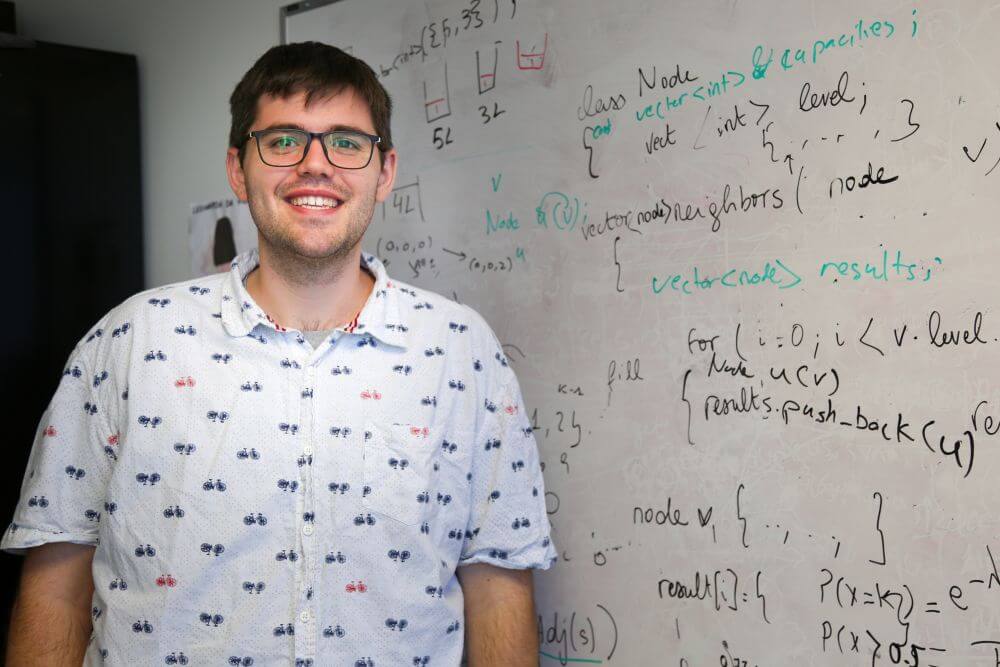ISI Spotlight: Fred Morstatter, Computer Scientist

Predicting the next geopolitical event—from who will be the next Pope to who will win the national election in India—is no easy task. But ISI Computer Scientist Fred Morstatter is up for the challenge.
In ISI’s artificial intelligence division, Morstatter is working on combining forecasts made by machines with those made by humans to better predict global event outcomes, including political protests, leadership disruptions and even oil price changes.
We sat down with Morstatter to find out more about his past experience and the complex science of predicting future events. What follows is an edited and condensed version of that conversation.
Dr. Morstatter, your geopolitical events forecasting research sounds very intriguing. Can you give us an example of an event that could be predicted by the machine-learning model?
Sure, one example would be protests. For instance: how many protests will happen in a specific country within a specific date range. The system could also predict commodity prices, such as oil, and the likelihood of a disease outbreak in a specific country. In this case, we are designing a hybrid system: the system integrates both predictions by humans and machines to create a more accurate and scalable system.
Interesting. In my experience, many political science researchers lean heavily on traditional approaches like case studies because the number of variables in social sciences seems too difficult to quantify or model. Do you think your work sheds a light on a new research method for political science and other social sciences?
I hope so. At this stage, the questions we answer best are quantitative in nature. Our approach works with those types of questions because there are large numbers of datasets built around these political events. Our machine models exploit those datasets in order to make predictions about the future.
So, you recently completed the first year of the project. What’s the next step?
Right now, we are building models that attempt to answer questions about things that have never happened before, or only very rarely. For instance, will a certain prisoner be released from a particular country by a specific date—there’s no dataset you can look at for that. Instead, we are building machine models that consider other events happening in the country to try to determine the answer to the question.
The geopolitical forecasting project gives us a new perspective on how machine-learning technologies could be applied to predicting events in the real world. The same applies to your social media-mining research. But why are you so passionate about integrating computer science with social science in the first place?
How do I pick one reason, hmmm? I would say most areas of computer science depend on applied math. So, I build an algorithm, and I know for sure it’s going to work. But in my field, you may build an algorithm and you may test it. But you may find it fails for reasons you never anticipated. Usually that reason is grounded in human behavior. To build an algorithm that reflects society and makes good predictions, you have to understand how people operate and interact. So there’s undoubtedly a multi-disciplinary aspect that really brightens your knowledge and that’s why I find this area of work so enriching.
Let’s step back, tell us a bit more about your path to computer science and eventually becoming a computer scientist at ISI.
I grew up in Akron, Ohio. Then I went to Arizona State University in Phoenix for my undergrad and grad school and then I moved here. I don’t really remember having career ambitions other than being a computer scientist. I started coding at around 15—the first things that I learned was basic Bash scripting, like how to automate mechanical tasks and so on. From there I picked up C++, Python and Java—and the rest is history.
When did you join ISI and why?
I joined ISI in July 2017. Initially, I wanted to become a faculty member at a university somewhere, but I chose ISI because it has a unique blend of academia and an industry flavor as well. ISI has the ability to execute projects that are much larger than traditional academic institutions, like the geopolitical forecasting project we talked about. At ISI, we have the resources to carry out research projects at a scale much larger scale than many other places.
What is it like working with other researchers at ISI?
Most people are world experts at what they do. They can give you guidance and help shape the direction of the project. It’s a big reason why I came here—to work with dedicated and motivated people.
So, it’s been a long way from that 15-year-old learning to code to a fully-fledged computer scientist. What would be your advice to other younger computer scientists?
I would say: Always do the most interesting things in life instead of the most lucrative. If you follow your passion, I think life has a way of working out.
Published on April 2nd, 2019
Last updated on May 17th, 2021